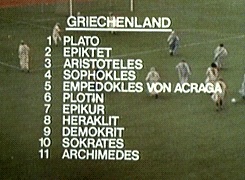Ricochet is the best place on the internet to discuss the issues of the day, either through commenting on posts or writing your own for our active and dynamic community in a fully moderated environment. In addition, the Ricochet Audio Network offers over 50 original podcasts with new episodes released every day.
 Guess Who’s Way Smarter than You!
Guess Who’s Way Smarter than You!
 Freakin’ Gottfried Wilhelm Leibniz, that’s who! But golly–what a weirdo! And I’m not just talking about his hairdo and those funny clothes. Leibniz is the monad guy. Yes, that guy, one of philosophy’s weirdest. The guy who said pretty much everything is a monad!
Freakin’ Gottfried Wilhelm Leibniz, that’s who! But golly–what a weirdo! And I’m not just talking about his hairdo and those funny clothes. Leibniz is the monad guy. Yes, that guy, one of philosophy’s weirdest. The guy who said pretty much everything is a monad!
What’s that you say? “What’s a monad?” Well, I’m so glad you asked! A monad is a mental atom, or a psychic atom–meaning that it’s a thing that has perception and is not made of any parts.
You’re a monad. So is G-d. (But G-d is basically the Super Monad.) And your chair is a monad. Even molecules are monads. Basically, everything that’s a thing has a monad–or, rather, is a monad.
Perception is everywhere, and nothing interesting is made of matter.
Also, matter can’t think, and if you were ever wondering how the mind connects to the body, Leibniz has an answer: It doesn’t.
In fact, monads never even interact with anything. People don’t even interact with each other. All our perceptions, including the appearance of interacting with others, are pre-established and arranged by G-d!
Does this all sound super weird? Yes.
Does it sound like the sort of philosophy that gives philosophy a bad name? Maybe.
But Leibniz is still a freakin’ genius, smarter than you are and smarter than I am. Even if he’s weird and wrong, he’s still a genius, and there’s got to be something useful or insightful in these ideas.
But if you want an idea as to what, my first piece of advice is: Don’t bother. It’s not that it isn’t there; it’s just that Leibniz, even more than most philosophers, takes some work to understand properly before we can evaluate him properly. You’re probably not ready for it. I don’t think I am either.
But if you still really, really want an idea as to what we can find in Leibniz that’s useful or insightful, here’s my second piece of advice: Try on his argument that matter cannot produce consciousness.
It’s pretty cool, but it needs just a bit of updating to deal with contemporary physics. Chunks of matter pushing against each other have nothing to do with consciousness, he says. But if you add some energy to this arrangement it still has nothing to do with consciousness. And, with or without the update, making it more complex is just taking that which has nothing to do with consciousness and . . . adding to it more of that which still has . . . nothing to do with consciousness.
That argument is the subject of “Leibniz’ Monadology: Video 5″ in my “The Philosophers in Their Own Words” playlist on YouTube. There are a total of eight videos on Leibniz.


And if you hate YouTube, here‘s an all-Leibniz playlist/channel on Rumble with the same videos (possibly not all aired yet), and here’s where you can subscribe to me on Rumble.
Don’t worry–we’ll get back to the Greco-Roman philosophers soon. I have Seneca videos to advertise!
Published in General



Reginald Garrigou Lagrange > Leibniz
If everything is a monad, then nothing is.
I learned that from Syndrome in The Incredibles.
You’re a monad.
I’m not clear on the substantive difference between Leibnitz’s monads and Plato’s forms.
https://edwardfeser.blogspot.com/2011/05/leibnizs-mill.html
That link implies that a mill is not a monad because it’s made of many parts.
In the OP, SaintA wrote that a chair is a monad. A chair is made of many parts.
Somebody’s lying!
Someone needs to chair a meeting and get to the bottom of this.
Dunno. It starts with ‘mo.’
Don’t knock monads. It’ll turn you into a stony outcropping.
@saintaugustine, I have really enjoyed this post, and am enjoying the discussion. Good stuff!
Feser is great, and if we disagreed there’d be a good chance I’d be the wrong one.
But we don’t need to worry about that right now. I don’t see any disagreement.
He’s talking about the same argument I mentioned, the one I cover in Video 5.
A machine has parts, and if you think about it you’ll find that it cannot be conscious. That’s why consciousness only happens in mental atoms–things with perception that don’t have parts, or monads.
But as for parts–yes, a thing made of matter has parts, always. But monads aren’t made of matter. A chair is a monad, not a thing made of matter.
But monads do correspond to other monads, and a chair corresponds to the monads of four different chair legs. But it’s not a part-to-whole relationship; it’s something else, something to do with what they perceive.
They’re both non-physical realities.
But a Form is universal, and every monad is individual.
In Plato, there’s one Form of Chairness, and every chair partakes of it.
In Leibniz, every chair is its own monad. There is no universal Chairness.
Box’s Law
Instugator’s Corollary to Box’s Law
Thanks, and thanks for joining in! Good Epicurus contrasts to remind us of, and that one sentence really was awesome.
Well then my work here is done. I can die happy!
Well that’s just silly. Plato should whackbat the guy.
Can ideas be monads? Because if they can, then the idea of “chairness” is a monad. And if “chairness” is a monad, then all chairs participate in that.
Welcome to the self-defining non-rigor of at least *my understanding* of this.
No. Ideas are things monads have.
I shall leave you to it, gentlemen.
Wallet, handbag, monad. So, I carry ideas around in my Monad handbag – manufactured by Gucci.
Leibnitz borrowed from (plagiarized) Pythagoras in his use of the term “monad.” Pythagoras conceived of the world/cosmos as composed of entities that he termed Monads, Dyads, Triads, etc. His vague ideas suggest that he may have thought of these entities as akin to the mathematical ratios of musical harmonics, as energy, or vibrations. He did not specify these as material or otherwise, but one gets the idea that he thought of them as energetic vibrations/harmonies, as in the small whole number ratios of harmonic tones that he investigated. He sort of combined the concept with geometry, giving dimension to his entities. And then extended the idea to the cosmos with his concept of the “Music of the Spheres”.
His concepts are actually quite compatible with wave/particle duality in Quantum physics. He may well have been right at home in the early 20th Century.
And Leibnitz, with his “monadology” was, contrary to many scientists and thinkers of his time, NOT an atheist. Today, almost all scientists are atheists, and utterly discard Leibnitz’ monadology with it’s central concept of God. An exception was Kurt Godel, who was, arguably, a far greater logician than Aristotle, and actually proved mathematically the transcendent (“transfinite”) capacity of human consciousness. Godel’s model of reality was, he said, completely contrary to modern science, similar to Leibnitz’s monadology with the central monad of God, was optimistic and theological.
And, of course, Quantum mechanics presents us with the ultimate conundrum, namely that human consciousness directly interacts with matter (collapses the wave equation–see Shrodinger’s Cat). How can consciousness directly interact with matter if it does not have some sort of material property? If consciousness is not material, then material causality is gone. If it is somehow material, how can it be described in materialist terms?
Shameless plug. A description of how that could be is available free to all Ricochetti here: Noesis, the book
No, just the noisiest ones.
Yeah, Leibniz’ argument in my opening post needs some rethinking if physics suggests matter is fundamentally consciousness or something not separate from it.
Or, better yet, we could just say that science finally caught up with Leibniz!
Your book is still open on my office compy. I try to read a few paragraphs from time to time. Slow going, but so is all my reading these days.
Actually, science is nowhere near catching up with Leibnitz. Physicists have spent the last 100 years mostly trying to ignore the implications of quantum mechanics, and those who have not ignored those implications have failed to produce anything like an explanation for that highly undesired finding that fell out of Quantum mechanics that drove Shrodinger to distraction (he adopted a somewhat Vedantic panpsychism, that Conscioiusness is the only thing that exist) and that Niels Bohr insisted should not be discussed in politic physics company.
Would it be fair to say that the evidence almost caught up to Leibniz, but that the physicists themselves have not followed up on it very well?
I would say (though everyone but Godel would disagree) that Leibnitz was very much on to something (consciousness is qualitatively different than matter in a sense, with surprising properties that physicists have difficulty grasping), that quantum mechanics has provided a way to extend Leibnitz (by allowing a physical characterization of consciousness that changes entirely how one thinks of the physical cosmos), but the physicists are completely unwilling to consider the implications of their own science that could enlighten them in the direction of Leibnitz, as, with Leonard Susskind, quoting LaPlace, they discard, and refuse to consider, the hypothesis of Deity.